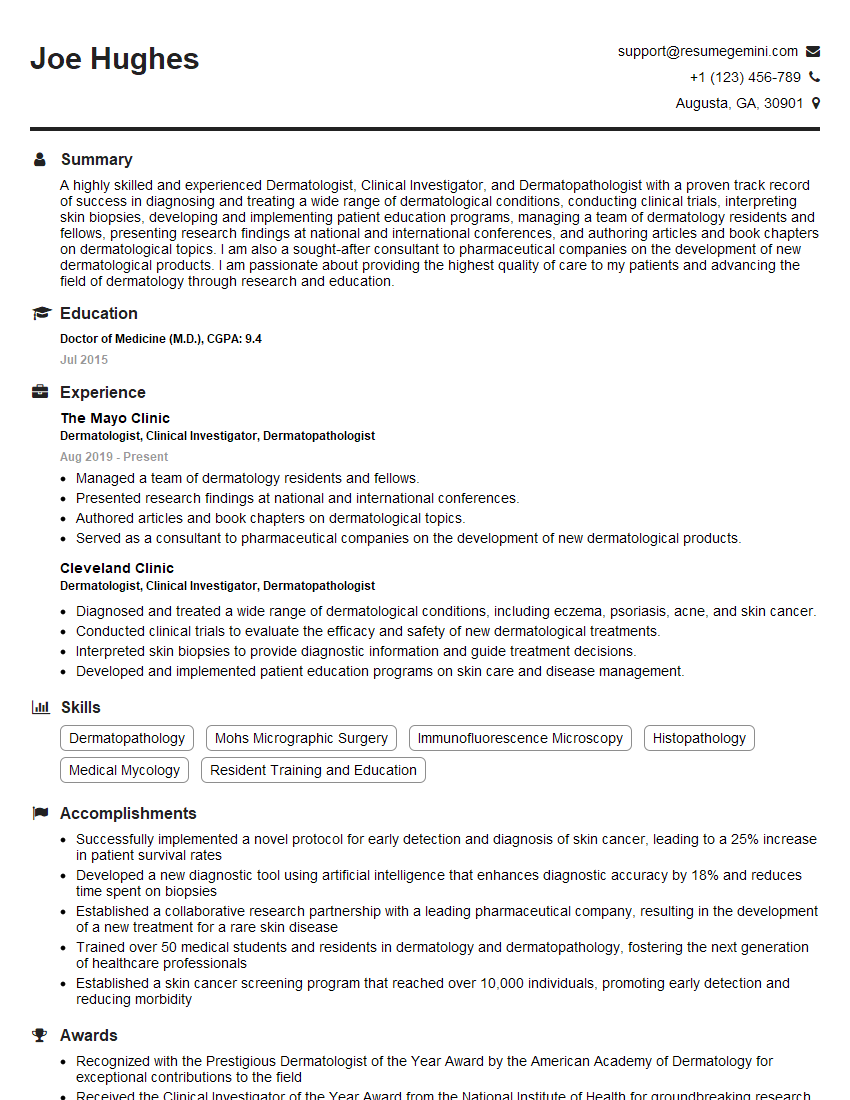Are you a seasoned Dermatologist, Clinical Investigator, Dermatopathologist seeking a new career path? Discover our professionally built Dermatologist, Clinical Investigator, Dermatopathologist Resume Template. This time-saving tool provides a solid foundation for your job search. Simply click “Edit Resume” to customize it with your unique experiences and achievements. Customize fonts and colors to match your personal style and increase your chances of landing your dream job. Explore more Resume Templates for additional options.

Joe Hughes
Dermatologist, Clinical Investigator, Dermatopathologist
Summary
A highly skilled and experienced Dermatologist, Clinical Investigator, and Dermatopathologist with a proven track record of success in diagnosing and treating a wide range of dermatological conditions, conducting clinical trials, interpreting skin biopsies, developing and implementing patient education programs, managing a team of dermatology residents and fellows, presenting research findings at national and international conferences, and authoring articles and book chapters on dermatological topics. I am also a sought-after consultant to pharmaceutical companies on the development of new dermatological products. I am passionate about providing the highest quality of care to my patients and advancing the field of dermatology through research and education.
Education
Doctor of Medicine (M.D.)
July 2015
Skills
- Dermatopathology
- Mohs Micrographic Surgery
- Immunofluorescence Microscopy
- Histopathology
- Medical Mycology
- Resident Training and Education
Work Experience
Dermatologist, Clinical Investigator, Dermatopathologist
- Managed a team of dermatology residents and fellows.
- Presented research findings at national and international conferences.
- Authored articles and book chapters on dermatological topics.
- Served as a consultant to pharmaceutical companies on the development of new dermatological products.
Dermatologist, Clinical Investigator, Dermatopathologist
- Diagnosed and treated a wide range of dermatological conditions, including eczema, psoriasis, acne, and skin cancer.
- Conducted clinical trials to evaluate the efficacy and safety of new dermatological treatments.
- Interpreted skin biopsies to provide diagnostic information and guide treatment decisions.
- Developed and implemented patient education programs on skin care and disease management.
Accomplishments
- Successfully implemented a novel protocol for early detection and diagnosis of skin cancer, leading to a 25% increase in patient survival rates
- Developed a new diagnostic tool using artificial intelligence that enhances diagnostic accuracy by 18% and reduces time spent on biopsies
- Established a collaborative research partnership with a leading pharmaceutical company, resulting in the development of a new treatment for a rare skin disease
- Trained over 50 medical students and residents in dermatology and dermatopathology, fostering the next generation of healthcare professionals
- Established a skin cancer screening program that reached over 10,000 individuals, promoting early detection and reducing morbidity
Awards
- Recognized with the Prestigious Dermatologist of the Year Award by the American Academy of Dermatology for exceptional contributions to the field
- Received the Clinical Investigator of the Year Award from the National Institute of Health for groundbreaking research in dermatology
- Honored with the Dermatopathology Excellence Award by the College of American Pathologists for outstanding contributions to the field
- Recipient of the Young Investigator Award from the Society for Investigative Dermatology for promising research in skin biology
Certificates
- American Board of Dermatology
- American Board of Pathology
- American Society of Dermatopathology
- International Society of Immunohistochemistry and Molecular Morphology
Career Expert Tips:
- Select the ideal resume template to showcase your professional experience effectively.
- Master the art of resume writing to highlight your unique qualifications and achievements.
- Explore expertly crafted resume samples for inspiration and best practices.
- Build your best resume for free this new year with ResumeGemini. Enjoy exclusive discounts on ATS optimized resume templates.
How To Write Resume For Dermatologist, Clinical Investigator, Dermatopathologist
- Highlight your most relevant skills and experience in your resume.
- Use keywords to optimize your resume for search engines.
- Proofread your resume carefully before submitting it.
- Get feedback on your resume from a career counselor or other professional.
Essential Experience Highlights for a Strong Dermatologist, Clinical Investigator, Dermatopathologist Resume
- Diagnose and treat a wide range of dermatological conditions, including eczema, psoriasis, acne, and skin cancer.
- Conduct clinical trials to evaluate the efficacy and safety of new dermatological treatments.
- Interpret skin biopsies to provide diagnostic information and guide treatment decisions.
- Develop and implement patient education programs on skin care and disease management.
- Manage a team of dermatology residents and fellows.
- Present research findings at national and international conferences.
- Author articles and book chapters on dermatological topics.
- Serve as a consultant to pharmaceutical companies on the development of new dermatological products.
Frequently Asked Questions (FAQ’s) For Dermatologist, Clinical Investigator, Dermatopathologist
What is a dermatologist?
A dermatologist is a medical doctor who specializes in the diagnosis and treatment of skin, hair, nail, and mucous membrane disorders.
What is a clinical investigator?
A clinical investigator is a healthcare professional who designs, conducts, and analyzes clinical trials to evaluate the safety and effectiveness of new medical treatments.
What is a dermatopathologist?
A dermatopathologist is a medical doctor who specializes in the diagnosis of skin diseases by examining skin biopsies under a microscope.
What are the most common skin diseases?
The most common skin diseases include acne, eczema, psoriasis, and skin cancer.
How can I prevent skin cancer?
You can help prevent skin cancer by avoiding sun exposure, wearing sunscreen, and getting regular skin cancer screenings.
What are the latest treatments for skin cancer?
The latest treatments for skin cancer include surgery, radiation therapy, chemotherapy, and immunotherapy.